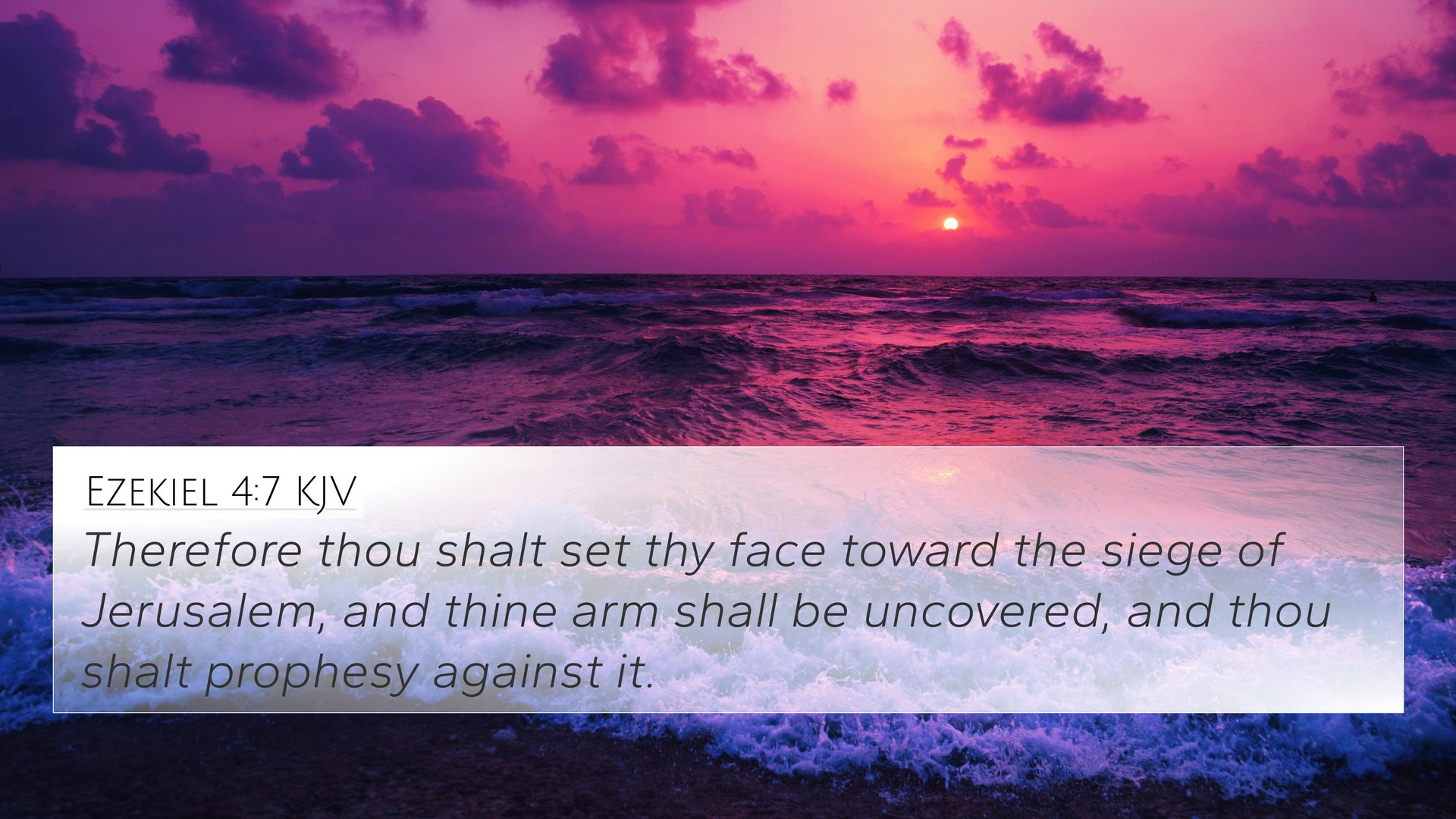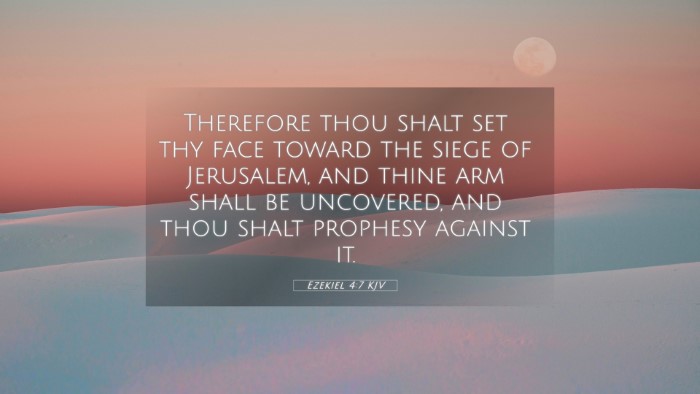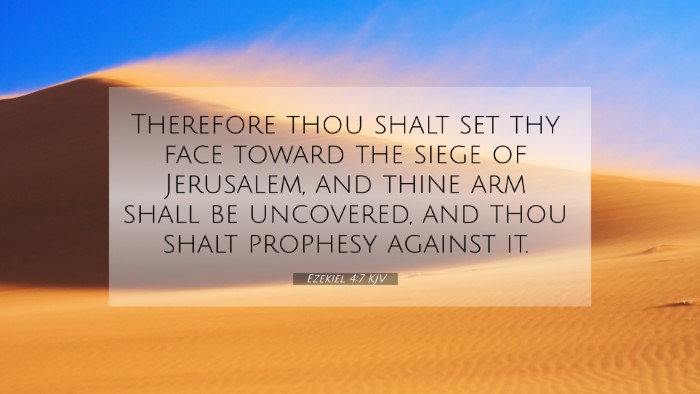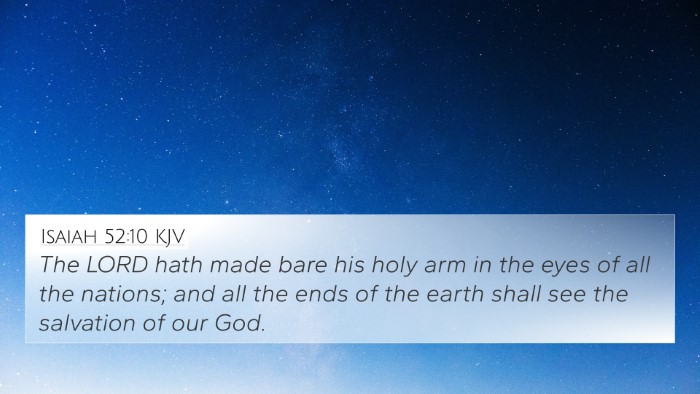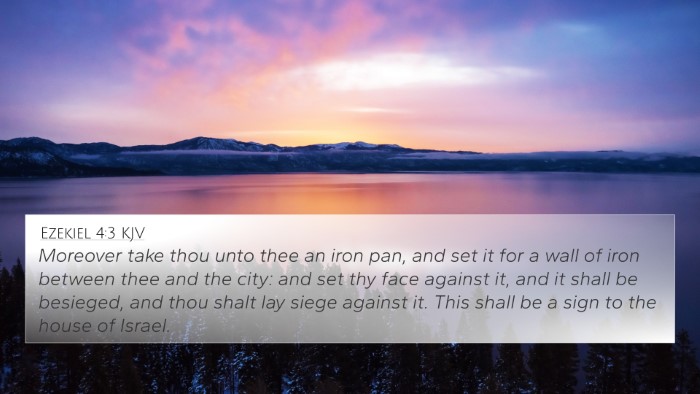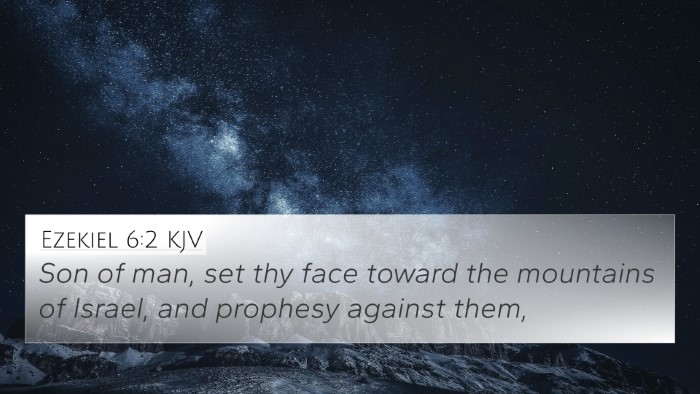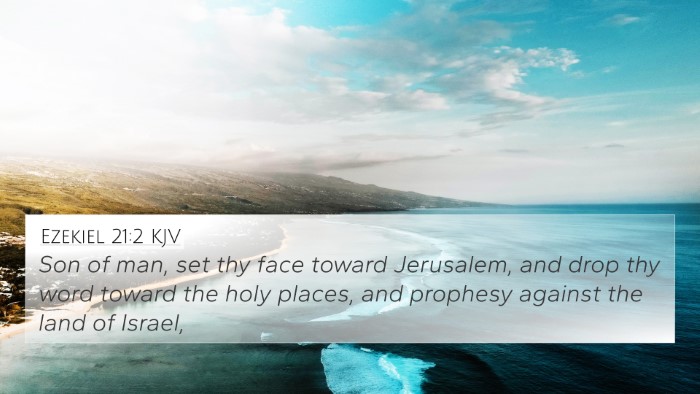Understanding Ezekiel 4:7
Ezekiel 4:7 states: "And you shall set your face toward the siege of Jerusalem, with your arm bared, and you shall prophesy against her." This verse is part of a larger prophetic message where the prophet Ezekiel is instructed by God to enact a symbolic representation of the siege against Jerusalem. Below we explore the various interpretations and insights derived from traditional public domain commentaries including those by Matthew Henry, Albert Barnes, and Adam Clarke.
Context of Ezekiel's Prophecy
Before diving into the explanation of this verse, it's essential to understand the context of Ezekiel’s ministry. He prophesied during a time when Israel was facing significant judgment due to their spiritual rebellion and idolatry. Ezekiel's role was to convey God's message of impending doom and eventual restoration.
Verse Interpretation
According to Matthew Henry's Commentary, Ezekiel being instructed to "set your face toward the siege" illustrates the reality of the siege that will come upon Jerusalem. It signifies God’s intention and the inevitability of the prophesied events. Henry emphasizes the seriousness of God’s warnings and the necessity for the people to recognize the gravity of their sin.
Albert Barnes further articulates that this act of prophesying against Jerusalem demonstrates God's desire to confront the city’s iniquities directly. Barnes notes that the "arm bared" symbolizes not only readiness but the authority and power with which God mandates His messenger to deliver the message. It highlights the intensity and urgency of the coming judgment.
From Adam Clarke's perspective, he views this command to prophesy as a profound act of defiance against the people's complacency. Clarke points out that standing against such a fortified city while bare-armed signifies the immense spiritual battle and foreshadows the ultimate triumph of divine justice. Clarke’s commentary invites readers to consider the broader implications regarding the struggle between good and evil.
Thematic Connections
This verse does not stand alone; instead, it is enriched by various Bible verse cross-references. Below are key verses that resonate with the themes expressed in Ezekiel 4:7:
- Jeremiah 1:17 - "But you, dress yourself for action. Arise, and say to them everything that I command you." (Echoes the urgency of God's call to prophets)
- Isaiah 58:1 - "Cry aloud; do not hold back; lift up your voice like a trumpet; declare to my people their transgression." (Similar prophetic instruction to confront sin)
- Lamentations 2:5 - "The Lord has become like an enemy; he has swallowed up Israel." (A reflection on Jerusalem’s downfall)
- Ezekiel 3:17 - "Son of man, I have made you a watchman for the house of Israel." (The role of the prophet emphasized)
- Matthew 23:37 - "O Jerusalem, Jerusalem, the city that kills the prophets and stones those who are sent to it!" (New Testament reference to Jerusalem's history with prophets)
- Luke 19:41-44 - Jesus weeps over Jerusalem, foreshadowing its destruction, linking Old Testament prophecies with New Testament fulfillment.
- Revelation 11:3 - "And I will grant authority to my two witnesses, and they will prophesy for 1,260 days, clothed in sackcloth." (Connection of prophecy through various ages)
- Habakkuk 2:1 - "I will take my stand at my watchpost and station myself on the tower." (Similar call to vigilance in prophecy)
- Micah 3:8 - "But as for me, I am filled with power, with the Spirit of the Lord, and with justice and might, to declare to Jacob his transgression." (Empowerment of the prophet)
- Hebrews 1:1-2 - "Long ago, at many times and in many ways, God spoke to our fathers by the prophets." (Affirmation of prophetic ministry)
Conclusion
Ezekiel 4:7 serves as a profound reminder of the responsibilities placed upon God’s messengers and simultaneously showcases the seriousness of the judgments pronounced against those who turn away from Him. Through cross-referencing with other scriptures, one can see the consistency of God's message throughout the Bible. The themes of accountability, warning, and ultimate hope for restoration resonate deeply across different passages, reinforcing the unity of scripture.
Utilizing tools for Bible cross-referencing can greatly enhance the understanding of passages such as Ezekiel 4:7. By exploring Bible verses that relate to each other, believers can gain valuable insights into God’s character and His dealings with humanity throughout history.
For anyone engaging in cross-reference Bible study, the insights gleaned from Ezekiel 4:7 and its connections to other scriptural texts offer rich, thematic content that both informs and transforms the reader’s understanding of biblical prophecy and its implications today.
